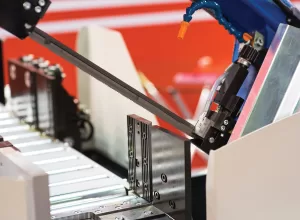
by Jennifer Kohlhepp | CM Magazine Featured
Enhancing Competitiveness Through Small Order Processing
By Jennifer Kohlhepp, Managing Editor, ICMA

To effectively compete against low-cost, high-volume competitors, businesses must embrace personalization and small order processing as key value drivers. However, establishing a manufacturing process capable of individualized order fulfillment poses significant challenges.
George E. Daddis Jr. PhD, CEO/president at Bristol ID Technologies and an International Card Manufacturers Association (ICMA) board member, offers insights into overcoming these obstacles, focusing on digital order automation and manufacturing job management.
Opportunities in Small Order Processing
Many businesses thrive on low-SKU-count, high-volume models, but competing with such enterprises necessitates innovation. Overseas competitors, often focused on price, face disadvantages in shipping costs and lead times, creating openings for businesses capable of efficiently processing small orders and offering customization. Additionally, customers prefer domestic facilities for personalization due to data sensitivity, providing further competitive advantage. Moreover, adaptable small-order businesses are better positioned to respond to evolving market needs and technological trends, fostering innovation and customer satisfaction.
Challenges in Manufacturing Process for Individualized Orders
Scaling a manufacturing process for individualized orders requires substantial investment and planning. Challenges include marketing to attract small customers or high-volume small orders and developing efficient back-office processes to handle numerous purchase orders. The administrative burden of processing individual orders is significant, demanding automated solutions to manage costs effectively.
Operational challenges include high setup costs for offset presses, fixed costs relative to job size and the inherent efficiency of long runs and small SKU counts. Designing a flex-manufacturing line to handle multiple card builds and options while planning capacity presents further hurdles.
Solutions for Small Order Processing
Efficiently handling high volumes of small orders entails grouping orders into gang runs or streams that can be processed as one job. Digital automation is key, aiming to eliminate manual handling or human intervention at the individual order level. Orders are accepted digitally, checked and composed into streams/gangs in the virtual realm. A “digital twin” representation of each order in software facilitates automation, enabling identification and unique processing of orders within a gang using RFID or barcodes. This automation streamlines operations, enhances scalability, reduces costs and minimizes errors.
In conclusion, while building customizable manufacturing lines is feasible, it requires intentional planning and investment in software engineering resources alongside robust modular manufacturing line design. By addressing these challenges effectively, businesses can unlock the benefits of individualized order processing and maintain competitiveness in the market.





